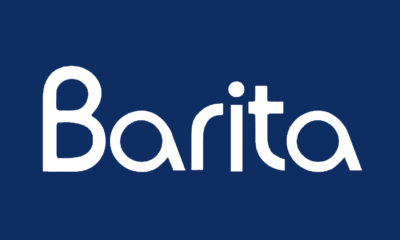Businessuite Markets
Barita Looking To A Future Built On A New Digital Platform As It Seeks To Be Resolute In Making Barita More Accessible, Convenient And Customer Focused.
Published
3 years agoon

Mark Myers Chairman Barita Investments Limited (“Barita” or “the Group”) has released the following Group unaudited financial statements for the nine months of the financial year 2022.
The results reflect the investments being made in building the capabilities necessary to execute our strategic growth initiatives.
Strategic Highlights
We continued to remain focused on strategy execution for this transformative year, with highlights for the quarter including:
• Continuing to advance our digital agenda, completing the implementation of phase one of our customer relationship management solution and remaining well on schedule with the transformation of our core operating system that we spoke about in our 2020 and 2021 APO prospectuses. We also made significant improvements to our Barita Online platform, allowing our customers to request loans, and buy and redeem unit trust shares and equites at any time.
• Revamping and relaunching our Real Estate Unit Trust product to make it more accessible through a reduction in unit price and minimum investment (through a 10 to I split), as well as shorter lock-up periods. We subsequently allowed our clients access to the assets in our managed special purpose vehicle, MJR Real Estate Holdings (MJR), through this fund.
• Establishing our Premium Wealth and Corporate Solutions unit, which is working with our Investment Banking, Treasury and Asset Management teams to develop offerings for our institutional and high net worth clients.
• Maintaining the strategic priority of talent development and recruitment. We are especially pleased that our five young high potential analysts have successfully completed their first rotation through various business units within Barita and our affiliated companies in our two-year Cornerstone Analyst Program, which was launched in January 2022.
• Continuing the journey towards reorganization under a financial holding company, as required by the Banking Services Act under which our affiliated merchant bank operates.
• Continuing, through the Barita Foundation, to partner with government agencies, NGOs and with the Barita team to plan, sponsor and execute our corporate social outreach agenda aimed largely at young people in their education and entrepreneurial endeavours.
As we look to the future, we are resolute in making Barita more accessible, convenient and customer focused. We believe that digital platforms will help us achieve that end. We are in the first phase of that journey, and we will accelerate our build-out as we increase our capabilities in this regard.
As we navigated the uncertain environment, Barita continued to prioritize its liquidity and capital management, and remained focused on executing on its key strategic initiatives including flagship investments and a technology overhaul of the company.
Operating Performance
Against the backdrop of an increasingly uncertain operating environment, Net Profit for the nine-months period came in at $3.8 billion, a 4% increase relative to the FY21 outturn of $3.7 billion. The profit outturn translates to earnings per share of $3.18, which is 6% lower than the comparable period in FY 2021.
Barita registered net operating revenue of $7.2 billion for the nine months of FY 2022, representing a $535 million (8%) increase versus the prior year period.
The Group’s revenue base for 9M FY 2022 was comprised of:
Net Interest Income:
Net Interest Income (NII) reflected a $287 million (39%) increase year-over-year (“YoY”).
Net Interest Income (NII) reflected a $235 million (20%) increase year-over-year (“YoY”) to $1.4 billion for the year-to-date (YTD) period.
During the April – June quarter in particular, local market liquidity conditions were tight as a consequence of the Central Bank’s policy actions, which in turn led to higher interest rates on funding liabilities across the securities sector.
However, our continued focus on growing the Group’s alternative investments, credit and fixed income portfolios provided a bulwark for NII, even as the repo funding rates rose.
Our net interest income is fundamentally linked to both local and global monetary policy measures that Central Banks are using to target the persistent levels of inflation. In that regard, we cannot be sure whether inflation is likely to abate soon, thus providing a basis for Central Banks to unwind their restrictive policy actions. As a result, NII is likely to remain a challenging item to grow in the ensuing quarters. Notwithstanding, we will continue to focus our attention on the pursuit of alternative investment strategies aimed at continuing to grow and diversify our investment portfolio.
Non-Net Interest Income:
Non-interest income reflected a modest year-over-year increase of 5% or $300 million, to $5.8 billion relative to $5.5 billion in the comparable period in FY 2021 (“9M FY 2021”). The increase in non-interest income was principally driven by a 163% increase in gain on investment activities and dividend income.
The details of our non-interest income are as follows:
Gain on Investment Activities:
The $1.6 billion increase in this line item was driven primarily by a combination of gains on our traditional proprietary trading portfolio, and those associated with exposure to alternative investments, specifically real estate and private equity through equity call options. This line item has displayed significant resilience against the backdrop of persistent inflation and the concomitant central bank policy actions that continue to challenge returns on traditional marketable securities. Therefore, our trading strategy with respect to our traditional proprietary trading portfolio continues to emphasize maintaining ample amounts of liquidity so that we can be positioned to take advantage of significant mispricing of securities. The addition of alternative investment exposures to our portfolio during preceding quarters has served us well as they provided revenue diversification against the negative effects of the year-to-date declines that have generally been seen in the prices of traditional asset classes.
Fees & Commission Income:
Fees and commission income declined by 7% to $2.5 billion relative to the corresponding FY 2021 result of $2.7 billion. This line item is comprised substantially of fees generated from our asset management and investment banking business lines. Revenues in this category declined primarily due to lower performance-based management fees in the asset management business. The outturn for the comparative period last year benefitted materially from the robust recovery of certain asset classes following the disruptions caused by the COVID-19 pandemic. Notwithstanding, the Group will continue its efforts to grow assets under management and capital markets activity through consistent deepening of our capabilities as well as building liquidity to fund investment banking deals.
Foreign Exchange (“FX”) Trading and Translation Gains:
The Group registered foreign exchange trading and translation gains of $602 million in the period, which is a $1.1 billion reduction or 66% relative to the corresponding period in FY 2021. The decrease was attributable to the effects of continued volatility experienced in the local foreign exchange market during the period.
Operating Expenses:
Non-interest Expenses for the nine-months of FY 2022 rose by 11% to $2.7 billion versus $2.4 billion for the corresponding FY 2021 period. The YOY rise in expenses is driven by increases in staff costs (by $233 million or 25%) and administrative expenses (by $79 million or 6%), while the Group’s expected credit losses (“ECL”) decreased to $93 million relative to $138 million compared to the same 2021 period, due largely to changes in the company’s overall portfolio mix coupled with the adjustment of assumptions underpinning the ECL calculations.
The increase in operating expenses reflects investment in the capabilities required to execute on the strategic growth initiatives that we have communicated. Furthermore, despite the rise in operating expenses, the Group’s efficiency ratio remained fairly steady at 37% versus 36% for the corresponding FY 2021 period.
Our year-to-date performance was achieved in the continued context of the inflation inducing impacts of supply-chain and labour market dynamics, which were exacerbated by the Ukraine/Russia conflict; and the corresponding price disrupting and margin tightening effects of global interest rate policy responses.
Balance Sheet Highlights
As at June 2022 the company had a combined increase of $18.1 billion in funding from repurchase agreements and secured investment notes relative to June 2021.
This, along with the net $7.1 billion increase in shareholder’s equity, largely funded the $25.7 billion growth in Barita’s asset base. Some of the key line items on the balance sheet are discussed in brief below:
Assets
Total Assets:
Barita’s total assets stood at $110.0 billion as at June 2022, representing a $25.8 billion or 31% increase over June 2021. This increase is largely the result of a $14.8 billion growth in marketable securities and $10.0 billion in loan receivables.
Pledged Assets and Marketable Securities:
Pledged Assets and Marketable Securities, combined, grew by $18.5 billion or 30% to $80.0 billion to account for 73% of the Company’s balance sheet as at June 2022. These lines represent substantively the Company’s investment portfolio, which is largely comprised of credit assets to include, local, regional & international government and corporate bonds.
Loans Receivables:
Barita’s exposures to loan receivables increased by $10.0 billion or 347% to $12.9 billion. Barita’s exposure to loans is largely comprised of secured credit facilities, including margin loans, which are extended to our clients.
Liabilities:
Total Liabilities: To fund the increase in total assets, we grew our total liabilities YOY by 35% or $18.6 billion to $72.6 billion.
Repurchase Agreements: The Company’s funding from Repurchase Agreements rose by $8.4 billion or 18% to $54.6 billion as of June 2022 which was 75% of the Company’s liabilities. Secured investment notes rose by $9.3 billion or 196% to $14.1 billion, which represented 19% of the company’s total liabilities.
Shareholders’ Equity:
The equity base of the Group grew significantly YOY, rising by 31% or $8.8 billion to close the period at $37.5 billion.
The outturn in shareholders’ equity was largely a result of the following:
• The Company’s September 2021 APO, which increased share capital by $10.8 billion (partly offset by treasury share transactions);
• An increase in retained earnings, net of dividends declared during the period; and a $2.3 billion reduction in fair value reserve.
The extent of negative fair value reserves was a function of the market volatility during the quarter, which drove fair value changes in key fixed income assets. Due to the asset diversification strategy being pursued by us, the reduction in fair value reserves was relatively moderate, at 6% of our capital base.
Capitalization, Stress Testing & Resilience to Current Headwinds
Barita continues to maintain robust capital and liquidity positions, both of which have demonstrated significant strength and resilience to withstand adverse market conditions. This is even more relevant in the current rising interest rate environment, which continues to place downward pressure on duration sensitive fixed income asset prices.
Capital management is integral to our risk management and, as such, we frequently subject our capital metrics to robust stress testing as we deploy our strategy and plan for the future. We remained well above regulatory requirements, with a capital to risk weighted asset ratio of 44%, more than 4 times the 10% requirement; and remained well above these requirements under our internal stress tests. This, combined with our underweight exposure to high beta securities, makes us significantly resilient to market downturns and has positioned us well to execute on key strategies, while allowing us to take opportunities that may arise.
Closing Remarks
In our 2020 and 2021 prospectuses we outlined our intended use of funds. Thus far:
• More than $3 billion has been directed to support various investment banking type transactions, which also straddle other areas of the business such as alternatives and structured finance
• The overhaul of the real estate Fund and the seeding of MJR accounts for approximately $10 billion
• Our private credit outlay has been approximately $5 billion
• The technology upgrade, to which we have committed approximately $850 million, is on-course
Barita continues to prospect for opportunities to expand its local and regional footprint.
Furthermore, we continue to focus on generating significant returns, particularly for our minority shareholders, who have seen a more than 1,175% increase in the value of their shareholding between September 2018 and June 2022. Meanwhile, the governance that serves to safeguard the interest of all our shareholders and other stakeholders, has also been deliberately strengthened, culminating in our Corporate Governance Index score increasing from “CC” to “A” during the same period.
We are confident that the strategic initiatives that we are pursuing will continue to redound to the benefit of all our shareholders, and more broadly all our stakeholders. I’d like to take this opportunity to also thank our various stakeholders for their continued support and, indeed their contribution to our success.
The confidence demonstrated by the investing public through our multiple capital raising activities, and the confidence demonstrated by our clients; complemented by the outstanding output of our talented and dedicated staff have been key tenets of our success. Our commitment to you is to continue working tirelessly to maintain your confidence as we revolutionize your relationship with money and deliver differential value to you, our shareholders and clients.
More Information CLICK HERE

You may like
-


Barita Reporting Treasury, Trading And Brokerage And Investment Banking Business Lines As Largest Contributors FY24 Performance
-


Barita Investments To Be Delisted, As Cornerstone Group Reorganization Underway
-


Barita Investments Increases Net Operating Revenues By 17%, For Q1 December 2022, As Net Profit Flat Matching That Of Previous Year.
-


Inside Barita’s Proprietary Investment Strategy
-


Corporate Movements at Barita Investments
-


Paula Barclay Barita Investments Limited Businessuite 2020 #1 Jamaica Main Market Chief Executive Officer (CEO)
Business Insights
Unilever’s Ice Cream Breakup: Why the World’s Biggest Ice Cream Maker Is Spinning Off Its Sweetest Business
In the Caribbean, consumers are unlikely to see immediate changes. Magnum, Cornetto, and Ben & Jerry’s will still be on shelves. But behind the scenes, distribution contracts, manufacturing strategies, and regional employment structures may evolve. For Unilever, it is one more step towards becoming a leaner consumer goods giant, one that believes future growth lies not in ice cream freezers but in personal care aisles and health cabinets.
Published
5 days agoon
July 13, 2025
 Unilever’s decision to separate its global ice cream business marks a turning point for the British-Dutch consumer goods giant, ending a long chapter defined by household brands like Magnum, Ben & Jerry’s, and Wall’s. For Caribbean markets, including Jamaica and Trinidad where Unilever’s ice cream presence has been part of local summers for decades, the announcement signals more than just a corporate restructuring – it reveals how major multinationals are rethinking their portfolios in an era where margins matter as much as market share.
Unilever’s decision to separate its global ice cream business marks a turning point for the British-Dutch consumer goods giant, ending a long chapter defined by household brands like Magnum, Ben & Jerry’s, and Wall’s. For Caribbean markets, including Jamaica and Trinidad where Unilever’s ice cream presence has been part of local summers for decades, the announcement signals more than just a corporate restructuring – it reveals how major multinationals are rethinking their portfolios in an era where margins matter as much as market share.
Unilever’s ice cream roots run deep. The company became the world’s largest ice cream maker through a series of acquisitions starting with Wall’s in the UK in 1922, then later adding iconic names like Ben & Jerry’s in 2000 for $326 million, and Magnum’s global expansion through the 1990s and 2000s. Ice cream was once seen as a reliable cash cow, buoyed by strong branding and premiumisation strategies that turned chocolate-coated sticks into €3 indulgences.
But the market has shifted. Ice cream remains a seasonal business, with strong summer peaks but low winter sales in Europe and North America. It is also capital-intensive, requiring cold chain infrastructure from factory to freezer, unlike Unilever’s personal care and home care products that sit easily on any shelf. While indulgence has driven growth in emerging markets, competitive pressures from local brands and private labels have squeezed margins.
Globally, the decision to separate ice cream was driven by financial discipline. Unilever’s management, under pressure from shareholders after years of underperformance, has been streamlining its business model. CEO Hein Schumacher, appointed in 2023, has prioritised sharper strategic focus and operational efficiency. Ice cream, with its complex supply chain and different retail dynamics, increasingly looked like an outlier in a portfolio that is otherwise shifting towards high-margin beauty, personal care, and health products.
In markets like the Caribbean, this separation could create both uncertainty and opportunity. Ice cream production, distribution, and marketing are deeply integrated into local Unilever operations. A new standalone ice cream entity, if it replicates moves seen in Europe or Asia, could seek local partnerships, contract manufacturing, or even divestments to agile regional players better able to manage distribution economics. This is not theoretical: in 2018, Nestlé sold its US ice cream business to Froneri, a joint venture with R&R Ice Cream, in a move that allowed it to keep brand rights while outsourcing operations to a specialist. Similar models may emerge for Unilever’s brands in smaller markets.
in 2018, Nestlé sold its US ice cream business to Froneri, a joint venture with R&R Ice Cream, in a move that allowed it to keep brand rights while outsourcing operations to a specialist. Similar models may emerge for Unilever’s brands in smaller markets.

Daniela Bucaro Chairman Unilever Caribbean Limited
For Unilever, the separation clears the path to focus on growth categories where it can maintain pricing power. It aligns with the broader FMCG trend of portfolio concentration. PepsiCo shed Tropicana and Naked juice brands in 2021 to focus on snacks and beverages with stronger profitability. Johnson & Johnson spun off its consumer health division into Kenvue in 2023. The logic is simple: investors reward companies that know what they want to be.
What remains to be seen is how the new ice cream entity, projected to be a €7 billion business, will navigate independent life. Without Unilever’s scale, brand investment may tighten, or it could become a more aggressive player, free from the bureaucracy of a sprawling multinational. Private equity interest is a possibility, though managing seasonality and complex cold chain operations will require operational expertise as much as financial engineering.
In the Caribbean, consumers are unlikely to see immediate changes. Magnum, Cornetto, and Ben & Jerry’s will still be on shelves. But behind the scenes, distribution contracts, manufacturing strategies, and regional employment structures may evolve. For Unilever, it is one more step towards becoming a leaner consumer goods giant, one that believes future growth lies not in ice cream freezers but in personal care aisles and health cabinets.
The separation is expected to be completed by the end of 2025. For now, Unilever’s corporate kitchen is busy carving out its sweetest business. The challenge ahead will be ensuring both companies can thrive – one scooping profits from beauty and wellness, the other proving that, even as a standalone, ice cream remains a timeless indulgence the world will never give up.
Businessuite Markets
Kintyre Holdings Actively Pursuing Funding To Support Expansion Of Visual Vibe
Published
2 weeks agoon
July 3, 2025
Tyrone Wilson Executive Chairman Of Kintyre Holdings (Formerly Icreate Limited) Has Released The Following Consolidated Unaudited Financial Results For The Quarter Ended March 31, 2025.
Executive Summary
Overview
 During the first quarter, the Group continued to focus on revenue growth through both organic performance and strategic expansion. The Group’s newest business unit, Parallel Renovations, executed its first project during the quarter as a pilot initiative. This successful engagement served as a foundation to validate our operational model, and based on its performance, the company is now accelerating rollout plans for the remainder of the year.
During the first quarter, the Group continued to focus on revenue growth through both organic performance and strategic expansion. The Group’s newest business unit, Parallel Renovations, executed its first project during the quarter as a pilot initiative. This successful engagement served as a foundation to validate our operational model, and based on its performance, the company is now accelerating rollout plans for the remainder of the year.
In addition to new business growth, Visual Vibe, our digital out-of-home media subsidiary, remained a core revenue contributor through its long-term client contracts, providing steady and recurring income to the Group.
Financial Performance
The Group reported revenue of $34.1 million, up from $32.9 million in Q1 2024, representing a 3.6% increase. While revenue growth was modest, it reflects positive early traction from Parallel Renovations alongside consistent performance from Visual Vibe.
Gross profit for the period totaled $18.8 million, compared to $26.1 million in the prior year. The reduction reflects initial ramp-up costs and resource investments associated with onboarding and delivering the pilot renovation project. These costs are expected to normalize and improve as volumes scale and operational efficiencies are realized.
The Group achieved a significant improvement in profit before tax, rising to $11.3 million from $0.3 million in Q1 2024, resulting in a PBT margin of 33.1%, up from just 0.8% in the prior period. This increase is attributed to disciplined cost management, efficient integration of operations, and improved margin conversion despite temporary gross margin pressures.
Net profit came in at $8.4 million, reversing the prior year’s loss of ($2.2 million). This demonstrates a turnaround in bottom-line performance, driven by effective financial discipline and the successful diversification of the Group’s business model.
Outlook
 The Group is actively pursuing funding to support the expansion of Visual Vibe and its broader portfolio of subsidiaries. To achieve this, the company is implementing a three-pronged financing strategy:
The Group is actively pursuing funding to support the expansion of Visual Vibe and its broader portfolio of subsidiaries. To achieve this, the company is implementing a three-pronged financing strategy:
1. Raising suitable debt financing to support operational scaling and strategic initiatives.
2. Unlocking value in existing assets, particularly through real estate holdings.
3. Executing a pending rights issue, which will provide equity-based capital to fuel growth.
With a renewed focus on capital efficiency, brand development, and scalable growth platforms, Kintyre Holdings remains committed to delivering long-term value for its shareholders and positioning itself as a diversified, forward-thinking. investment holding company.
For More Information CLICK HERE
Businessuite Markets
Businessuite Cover Story: Wigton’s Bold Bet – Could Tropical Battery Be the Key to Its Caribbean Clean Energy Empire?
This is exactly the model that global energy giants are pursuing: controlling the entire clean energy value chain to drive long-term sustainable revenues.
Published
2 weeks agoon
July 3, 2025

Mr. Gary Barrow, CD
Chief Executive Officer Wigton Energy Limited (WIG)
In a bold move set to redefine Jamaica’s energy and electric vehicle (EV) landscape, Wigton Energy Limited (WIG) has taken control of Flash Holdings Limited, raising its stake to 51 per cent. This acquisition, while strategic in accelerating the roll-out of EVs under subsidiary Flash Motors Company Limited (FMCL), also signals a deeper ambition: Wigton’s emergence as the Caribbean’s leading multi-solution renewable energy powerhouse.
Yet behind the headlines of Wigton’s pivot from its windfarm legacy lies an even more intriguing opportunity – one involving Tropical Battery Company Limited, the decades-old Jamaican battery and solar energy firm currently in the throes of a J$1.79-billion (US$11.09-million) secondary share offering.
The offering, extended for a second time to July 4, is designed to reduce debt and graduate the company from the Junior Market to the Main Market of the Jamaica Stock Exchange – a critical step in Tropical Battery’s quest to list on Nasdaq within the next three to five years.
The question on the minds of investors and analysts is simple: Could Tropical Battery become Wigton’s next big strategic play?
From Wind to Multi-Solution Renewables
Founded as Wigton Windfarm, the company rebranded in late 2024 to Wigton Energy Limited, reflecting a strategic pivot towards diversified clean energy solutions. Alongside wind, Wigton is now advancing solar photovoltaic (PV) projects, battery storage systems, and EV infrastructure – creating a full-suite renewable energy model.
The acquisition of Flash Holdings is a testament to this vision. Wigton’s initial 21 per cent stake, valued at J$112 million (just over 1 per cent of its total assets), was symbolic – an entry point into the EV market. The June 2025 expansion to majority control demonstrates serious intent to scale electric mobility, not only distributing EVs but enabling the charging infrastructure needed to drive adoption across Jamaica and, ultimately, the region.
Tropical Battery’s Debt, Expansion, and Nasdaq Dreams

Alexander Melville Chief Executive Officer Tropical Battery Company Limited
Meanwhile, Tropical Battery is fighting its own battles. Founded in 1950, the company has evolved into an integrated battery distributor, solar energy provider, and EV solutions player, with strategic acquisitions in Silicon Valley (Rose Electronics) and the Dominican Republic (Kaya Energy).
Yet its rapid expansion has come at a cost. Tropical is carrying significant debt, including a US$9.5-million bridge loan from CIBC Caribbean Bank and a maturing J$300-million bond. The current APO seeks to raise at least J$1 billion to stabilise its balance sheet, improve working capital, and clear the path to Main Market graduation and Nasdaq listing.
But with two extensions announced in quick succession, questions loom about investor appetite. Institutional investors have reportedly requested more time for internal processes – a potential window for strategic partners like Wigton Energy to step in.
By participating significantly in Tropical Battery’s APO, Wigton could secure a meaningful minority stake – potentially 10-20 per cent – positioning itself on Tropical’s board and integrating the firm’s battery manufacturing and distribution network into Wigton’s renewable energy and EV ecosystem.
Why This Alliance Makes Sense
On paper, Wigton and Tropical Battery are perfectly complementary.
| Wigton Energy | Tropical Battery |
| Wind, solar, BESS, EV distribution | Batteries, solar, EV services |
| Local grid expertise, renewable projects | US and regional market access, battery manufacturing |
| Expansion capital and project development capability | Need for strategic investor to reduce debt and scale |
A Playbook for Execution
Strategic Capital Injection: Wigton could anchor Tropical’s APO, sending a strong market signal and stabilising Tropical’s financial base.
Board Influence & Governance: Securing a board seat would align Tropical’s expansion with Wigton’s regional clean energy goals.
Joint Ventures for EV Charging: Tropical’s battery and solar solutions combined with Wigton’s utility-scale renewable projects could fast-track the installation of EV charging stations powered by clean energy – a win-win for emissions goals and revenue streams.
BESS & Grid Services: As Jamaica’s grid modernises, battery energy storage systems (BESS) will be critical for stabilisation and integration of renewables. Wigton and Tropical are both invested in this space, but collaboration could enable larger projects with better financing terms and risk sharing.
Nasdaq Roadmap: Tropical’s ambitions to list on Nasdaq could be strengthened by Wigton’s institutional backing, while Wigton benefits from the valuation uplift of an equity partner expanding into North America.
Risks and Realities
Of course, execution risks remain. Tropical’s debt burden must be managed carefully to avoid operational strain. Cultural and operational integration will require disciplined governance structures. For Wigton, investing in a non-controlling stake carries the challenge of influencing strategy without direct operational control – a delicate dance that only strong board-level partnerships can navigate.
The Bigger Picture
Ultimately, the strategic logic is compelling. Together, Wigton and Tropical Battery could create a vertically integrated clean energy and EV solutions group with:
✅ Renewable generation capacity
✅ Battery manufacturing and storage solutions
✅ EV distribution and charging infrastructure
✅ Access to regional and North American markets
This is exactly the model that global energy giants are pursuing: controlling the entire clean energy value chain to drive long-term sustainable revenues.
“The Caribbean Tesla?”
 As the Caribbean accelerates its renewable energy transition, the region needs companies with the vision, capital, and integration capability to deliver clean energy solutions at scale. Wigton’s rebranding is more than cosmetic; it is a bet on becoming the Tesla of the Caribbean – not only in EVs, but in energy storage, solar, and grid services.
As the Caribbean accelerates its renewable energy transition, the region needs companies with the vision, capital, and integration capability to deliver clean energy solutions at scale. Wigton’s rebranding is more than cosmetic; it is a bet on becoming the Tesla of the Caribbean – not only in EVs, but in energy storage, solar, and grid services.
By partnering with Tropical Battery, Wigton could create an ecosystem that powers Jamaica’s homes, businesses, and vehicles with clean, resilient energy – a transformative step towards the island’s 50 per cent renewable energy target by 2030.
And perhaps, in the years ahead, when investors search for the Caribbean’s first clean energy unicorn, it will be this strategic alliance they point to as the moment the region’s energy future changed forever.
Foot Notes
Company Overviews & Recent Moves
Wigton Energy Limited (WIG)
- Rebranded from Wigton Windfarm in November 2024 to reflect its pivot toward diversified renewables—wind, solar, batteries, and now EVs.
- Broadening into solar PV (won ~50 MW project in 2024), and developing battery storage alongside EV infrastructure.
- June 2025: boosted its stake in EV distributor Flash Holdings from 21% to 51%, aiming to fast‑track EV rollout via Flash Motors (FMCL). Wigton also provided corporate guarantees for FMCL loans
Tropical Battery Company Limited
- Jamaica-based battery and solar energy firm, listed in 2020; now distributes Mac Battery brand, solar solutions, and even sells Tesla vehicles
- Acquired Silicon Valley-based Rose Electronics and Dominican solar firm Kaya Energy; revenue doubled in late 2024 but profit fell due to debt
- Currently launching a J$1.79 billion (~US$11M) secondary share offering—now closing July 4—aimed at trimming debt and enabling migration from JSE Junior to Main Market, with Nasdaq aspirations in 3–5 years
Business Model Synergies
| Area | Wigton Energy | Tropical Battery |
| Core Offering | Wind, PV, storage, EV distribution | Automotive batteries, solar, energy storage |
| Geographic Reach | Jamaica (grid), regional expansion | Jamaica, US (Silicon Valley), Dominican Rep. |
| Debt/Capital | Asset-based growth, moderate debt | Significant debt load, seeking equity raise |
| Strategic Goals | Full-suite renewables + EV market | Debt elimination, market upgrade, Nasdaq prep |
There’s a strong alignment in battery energy storage systems (BESS) and EV charging infrastructure. Tropical’s access to the US market and grid storage tech aligns with Wigton’s ambition to become a “multi-solution renewable provider.”
Could Tropical Battery Be an Acquisition or Investment Target?
Acquisition—Full or Partial
Full acquisition improbable: Tropical’s valuation (~US$11M) and upcoming debt clearance means it’s not distressed enough to sell entire control cheaply.
Strategic merger: WIG could acquire a controlling minority stake—e.g., buying current shareholders’ stock and participating in the APO. This could integrate Tropical’s distribution and manufacturing capacity into Wigton’s ecosystem.
Participating in APO
With WIG’s guidance, investing in the July 4 APO (minimum J$1B) positions its shareholding favorable—potentially 10–20%+ depending on uptake.
This gives Wigton influence in Tropical’s board and strategic decisions without full takeover.
Strategic Alliance Framework
Coordinated capital raise: Wigton leads or coordinates participation in the APO, signalling stability and boosting investor confidence.
Cross‑shareholding : Tropical could take a stake in FSMC (Flash Motors), aligning EV ambitions and creating a shared EV–battery value chain.
Joint BESS & EV infrastructure roll‑out: Co-develop charging & storage solutions across WIG’s solar/Wind sites and Tropical’s commercial distribution footprint.
Regional market expansion: Tropical supports EV battery servicing and solar projects from its Jamaica/US base, while Wigton provides local grid integration and regulatory experience.
IPO/Nasdaq roadmap: Wigton’s participation helps Tropical graduate to JSE Main then aim for Nasdaq—giving Wigton a stake in a growth IPO narrative.
How This Can Be Executed
Due diligence: Wigton assesses Tropical’s balance sheet post-IPO, tech integration capabilities (e.g., Silicon Valley assets), and debt reduction efficacy.
Negotiation: Restructure APO conditions to secure stakes with board representation.
Legal integration: Form joint ventures for EV charging deployments and BESS installations, sharing risk and scaling faster.
Capital partnership: Align Tropical’s Nasdaq ambitions with Wigton’s institutional backing—opening a new funding channel.
Summary
While a full takeover of Tropical Battery isn’t likely and may not be necessary, strategic participation in its APO offers Wigton:
- Entry into battery manufacturing & EV services.
- A way into the US through Silicon Valley tech.
- Leverage Solar/BESS synergy.
- A shot at future upside via Tropical’s equity if it lists on Nasdaq.
Business Insights
Businessuite Cover Story: Too Much Power? Governance Risks Rise as Tyrone Wilson Consolidates Leadership at Kintyre and Visual Vibe
Introducing a non-executive Chair, appointing dedicated executives for strategic verticals, and strengthening board committees are proven routes to balancing entrepreneurial dynamism with fiduciary responsibility.
Published
2 weeks agoon
July 1, 2025
• Mr. Tyrone Wilson, who currently serves as Chairman, President & CEO of Kintyre Holdings (JA) Limited, and Chairman of Visual Vibe, has formally assumed the additional role of Chief Executive Officer of Visual Vibe, a wholly owned subsidiary of the Company.
• Ms. Jasmin Aslan has been appointed as Chief Business Officer (CBO) of Kintyre Holdings (JA) Limited, effective July 1, 2025.
• Mr. Andrew Wildish has resigned from his role as Chief Investment Officer of Kintyre Holdings (JA) Limited, effective June 30, 2025. The Company’s investment strategy will now be assumed by Chairman, President & CEO Tyrone Wilson, and will be supported by the Investment Committee of the Board, chaired by Mr. Nick Rowles-Davies.
 When Mr. Tyrone Wilson, Chairman, President, and CEO of Kintyre Holdings (JA) Limited, stepped into the additional role of Chief Executive Officer at Visual Vibe—alongside his existing portfolio—industry observers took note. His move, following the resignation of Chief Investment Officer Andrew Wildish, now consolidates strategic, operational, and governance control under one leader across the two connected companies.
When Mr. Tyrone Wilson, Chairman, President, and CEO of Kintyre Holdings (JA) Limited, stepped into the additional role of Chief Executive Officer at Visual Vibe—alongside his existing portfolio—industry observers took note. His move, following the resignation of Chief Investment Officer Andrew Wildish, now consolidates strategic, operational, and governance control under one leader across the two connected companies.
While some argue that this concentration of power streamlines decision-making, particularly in smaller or fast-moving firms, global governance standards paint a starkly different picture.
From the UK’s Cadbury Code to the OECD and US Dodd-Frank regulations, best practice guidelines consistently recommend separating the roles of Board Chair and CEO. The rationale is simple: independent oversight safeguards shareholders by ensuring that strategic decisions, executive compensation, and performance evaluations are objectively scrutinized. Harvard Law’s corporate governance research found that dual-role companies often pay more to their top executives and face elevated ESG and accounting risks, with lower long-term returns to shareholders.
In Mr. Wilson’s case, the risks are amplified by his assumption of the departed CIO’s investment strategy responsibilities. While an Investment Committee chaired by Mr. Nick Rowles-Davies will provide support, the absence of a dedicated CIO raises questions about execution bandwidth, focus, and strategic continuity.
His move, following the resignation of Chief Investment Officer Andrew Wildish, now consolidates strategic, operational, and governance control under one leader across the two connected companies.
Recent global examples demonstrate the potential fallout:
At Boeing, CEO Dennis Muilenburg’s dual role contributed to oversight failures during the 737 MAX crisis.
Starbucks faced shareholder pressure to separate Chair and CEO roles held by Kevin Johnson and later Laxman Narasimhan.
At Volkswagen, Oliver Blume’s simultaneous leadership of VW Group and Porsche raised warnings of strategic drift and governance conflict.
For shareholders, these scenarios underline a core truth: Checks and balances matter. Without an independent Chair to challenge decisions, or a standalone CEO focused solely on operational delivery, companies risk poor accountability, strategic blind spots, and diminished investor confidence.
Furthermore, frequent senior departures, as seen with Wildish’s exit, create instability, potentially eroding morale, institutional knowledge, and external credibility. For companies like Kintyre and Visual Vibe, operating in competitive markets requiring agile yet well-governed leadership, the tension between efficiency and accountability has never been more stark.
The path forward? Independent governance experts recommend immediate board-level evaluation of leadership structures to ensure robust oversight. Introducing a non-executive Chair, appointing dedicated executives for strategic verticals, and strengthening board committees are proven routes to balancing entrepreneurial dynamism with fiduciary responsibility.
At the heart of it all lies a question shareholders must ask: When one person wears too many hats, who holds them accountable?
Foot Notes
Governance Best Practices: CEO & Chair Separation
Independence & Oversight
– Combining CEO and Chair roles concentrates power in one person, weakening board oversight and independent challenge
– Governance codes worldwide (UK Cadbury, OECD, Dodd-Frank, etc.) recommend separate roles to avoid conflicts of interest and boost board independence
Costs & Performance
– Studies show companies with dual roles tend to pay more to the leader, exhibit higher ESG and accounting risks, and often deliver lower long‑term returns
Efficiency vs. Accountability
– Proponents argue unified leadership can streamline decision-making, especially in small, fast-moving or crisis settings
– Critics note that efficiency gains are outweighed by weakened accountability, less board challenge, and riskier executive decisions
Risks of Tyrone Wilson Holding Multiple Executive Roles
1. Conflict of Interest & Oversight Blind Spots
As CEO, President, and Board Chair of Kintyre, plus CEO of Visual Vibe, Mr. Wilson controls operational, strategic, and governance levers. This vertical integration drastically reduces independent oversight.
As BoardEvals points out, the Chair should be able to “challenge the CEO’s performance”—impossible when they’re the same person
2. Governance and Shareholder Accountability
– The Board’s duties include setting senior pay and evaluating leadership. With a unified Chair/CEO, Mr. Wilson effectively oversees his own compensation and reviews—undermining fiduciary trust
– Transparency risks arise if disclosures and rationale for dual roles aren’t clearly communicated to shareholders, as required under Dodd‑Frank §972 .
3. Execution Risk & Burnout
Fulfilling multiple demanding roles reduces bandwidth and focus. There’s evidence dual roles can dilute effectiveness and increase error risk .
4. Investor Confidence & Market Perception
– Majority of global investors favor role separation. Even large US firms are moving in that direction (44% of S&P 500 now combined vs. 57% a decade ago)
– Cases like VW (Blume), Starbucks (Niccol), Boeing (Muilenburg) show shareholders raising flags when executives take on both roles
Executive Departures & Instability
Andrew Wildish’s departure as CIO on June 30, replaced by Mr. Wilson & an Investment Committee, indicates a consolidation of high-level roles. Multiple senior exits can signal:
Leadership instability, undermining investor confidence and organizational clarity.
Strategic drift, especially in areas requiring specialized expertise.
Increased “agency” and “entrenchment” risk – where board oversight may be compromised by concentrated executive power .
Shareholder Considerations
Investors should be concerned when:
Checks and balances are diminished
With one executive occupying so many strategic and governance roles, board objectivity may be compromised.
Succession and crisis management are jeopardized
Who leads if Mr. Wilson is unavailable? What happens if rapid decisions are needed? Lack of emergency backup risks business continuity.
Specialized oversight is reduced
Investment strategy, compliance, audit—all risk oversight gaps when not handled by dedicated, independent executives.
External advisors step in
If retained, external governors may mitigate some risks—but at added cost and complexity.
Businessuite Markets
FosRich Reports Operating Loss of $68.6M, EPS Drops to Negative $0.01
The operating loss generated for the period was $68.6 million, compared to the profit of $32.9 million reported for the prior reporting period resulting in loss per stock unit of $0.01 compared to a profit per stock unit of $0.01 at March 2024
Published
3 weeks agoon
June 27, 2025
Cecil Foster Chief Executive Officer for FosRich Company Limited has released the following the unaudited results of FosRich for the three months ended 31 March 2025 and to report on the performance of FosRich.
Financial Highlights
• Revenues – $852.9 million compared to $859.8 million in the prior period.
• Gross profit – $305.6 million compared to $389.5 million in the prior period.
• Net (loss)/profit – ($68.6) million, compared to $33.0 million in the prior period.
• Earnings per stock unit – (-1) cent compared to 1 cent in the prior period.
Business Overview
 FosRich is primarily a distributor of electrical, lighting, and solar energy products. FosRich aims to differentiate itself from its competitors in the Jamaican marketplace by providing a quality and cost effective service, and by collaborating with clients on technical solutions. FosRich partners with large global brands seeking local distribution such as Huawei, Philips Lighting, Victron Energy, Siemens, NEXANS and General Electric. FosRich has a staff complement of two hundred and forty (240) people across ten (10) locations in Kingston, Clarendon, Mandeville, and Montego Bay. FosRich also has a team of energy and electrical engineers who offer technical advice and install solar energy systems, solar water heaters and electrical panel boards.
FosRich is primarily a distributor of electrical, lighting, and solar energy products. FosRich aims to differentiate itself from its competitors in the Jamaican marketplace by providing a quality and cost effective service, and by collaborating with clients on technical solutions. FosRich partners with large global brands seeking local distribution such as Huawei, Philips Lighting, Victron Energy, Siemens, NEXANS and General Electric. FosRich has a staff complement of two hundred and forty (240) people across ten (10) locations in Kingston, Clarendon, Mandeville, and Montego Bay. FosRich also has a team of energy and electrical engineers who offer technical advice and install solar energy systems, solar water heaters and electrical panel boards.
Our current-quarter numbers continue to be affected by the substantial fall in PVC and solar panel cost on the world markets. What this meant for us, is that despite achieving higher sales volumes, because our price reductions are passed on to our customers, we have achieved lower total sales income on these important lines of business. In addition, we were also affected by the slowness in housing-starts locally, caused primarily by the considerable increase in interest rates in Jamaica in the current period when compared to the prior period. We have not yet begun to benefit from the recent reductions in interest rates.
More importantly, our current quarter was adversely affected by international problems in the shipping industry, that continue to be affected by developments related to the operation of the Panama Canal. This resulted in significant delays in shipment for both finished goods and raw material. Raw material delays significantly interrupted our manufacturing operation during the quarter, which limited our ability to keep the market supplied with these needed products.
With the recent developments in the USA market, our global partners, in seeking to broaden and deepen their relationships with their non-USA customers, have offered more favourable credit terms to us, which should provide measurable benefits, going forward.
Income Statement
Income
The company generated income for the first quarter of $852.9 million compared to $859.8 million in the prior reporting period. Gross profit for the first quarter of 2025 was $305.6 million compared to $389.5 million for the prior reporting period. The main revenue drivers were Electrical and Hardware lines of business.
Administration Expenses
Administration expenses for the year-to-date was $337.4 million, reflecting a 12% increase on March 2024’s $301.6. The increased costs were fuelled primarily by increased staff related costs for increased staffing, increased travelling and motor vehicle expenses, increased insurance costs due to increases both in policy renewal rates and exposure, increased security cost due to additional locations and increased depreciation due to additional fixed assets.
Finance Cost
Finance cost for the year-to-date was $44.2 million compared to $$55.7 million in the prior period.
Net Loss
The operating loss generated for the period was $68.6 million, compared to the profit of $32.9 million reported for the prior reporting period resulting in loss per stock unit of $0.01 compared to a profit per stock unit of $0.01 at March 2024
Balance Sheet
Inventories
Since the start of the year, there has been some run-off of inventories, primarily due to the shipping issues discussed above. The company continues to proactively manage inventory balances and the supply-chain, with a view to ensuring that inventory balances being carried are optimised, relative to the pace of sales, the time between the orders being made and when goods become available for sale, to avoid both overstocking and stock-outs. Monitoring is both at the individual product level and by product categories.
Receivables
We continue to actively manage trade receivables with an emphasis being placed on balances in the over 180-day bucket. We have implemented strategies to collect these funds as well as to ensure that the other buckets are managed. We have re-evaluated all credit relationships. Where necessary, credit limits have been reduced and credit periods shortened. For some inventory items, we have instituted seven (7) day credit or cash. Sixty-four (64%) of receivables are within the current to 60-day category, mirroring December 2024. Receivables also include advance payments made to foreign suppliers for the increasing levels of inventories required to support our sales strategy.
Trade Payables
Our trade payables are categorised by foreign purchases, local purchases and other goods and services. While we have concentrated primarily on the foreign payables, as the bulk of our inventories are sourced from overseas. we continue to manage payables, for the most part, within the terms given by our suppliers.
Non-current Liabilities
Non-current liabilities have reduced by $101 million due to the run-off and maturing of facilities. Liquidity At balance sheet date the excess of current assets over current liabilities amounted to $843 million (31 December 2024 – $1,012 million), with the current ratio being 1.36:1 compared to 1.43:1 in December 2024. It is expected that FosRich will continue to be able to generate sufficient cash to meet obligations when they fall due.
Shareholders’ Equity
Shareholders’ equity now stands at $1,930 million, compared to $1,999 million on 31 December 2024. On 31st March 2025 there were 5,266 shareholders, compared to the 5,318 on 31 December 2024.
Other Matters

- New Activities Construction of our new FosRich Superstore & Corporate Offices at 76 Molynes Road is advanced, with completion date now projected to be Q3, 2025
- We have halted our plans to enter the United States market, until further notice.
- We continue to implement the specific strategies as outlined within our strategic plan, with a view to making the group more vertically integrated.
- We are cognizant that despite the challenges ahead within our local operating space and the wider global space, we have the right talents and leadership to deliver on our plans for the ensuing period. We will continue to execute our plans to ensure that we remain competitive and deliver value solutions to our customers.
As we report on the performance of FosRich, we thank our shareholders, employees, customers, and other stakeholders for their support as we continue to expand our business and bring greater value to our various stakeholders.
For More Information CLICK HERE

Jamaica Records US$2.4B in Earnings From 2.3 Million Visitor Arrivals Since Start of 2025

Unilever’s Ice Cream Breakup: Why the World’s Biggest Ice Cream Maker Is Spinning Off Its Sweetest Business

Jamaica Market Entry via Acquisition: Uber Eats’ Potential Playbook

Businessuite 2023 Top 100 Caribbean Companies – US$ Revenue
Which Company Has The More Sustainable Business Model….Edufocal or ICREATE and Why?

Jeffrey Hall Is Set To Be One Of The Most Powerful Men In Corporate Jamaica And The Caribbean. So, Who Is He?

Trending
-

 Businessuite Women2 weeks ago
Businessuite Women2 weeks agoData Mavericks of the Caribbean: Raquel Seville & Dataffluent’s Visionary Rise
-

 Businessuite News244 weeks ago
Businessuite News244 weeks agoIndia’s 10-Minute Delivery Boom: A Blueprint for Disruption—and a Wake-Up Call for Caribbean Courier Companies
-

 Businessuite News24 International4 weeks ago
Businessuite News24 International4 weeks agoIndia’s 10-Minute Delivery Boom: Reshaping Retail, Logistics, and Urban Spaces
-

 Businessuite News243 weeks ago
Businessuite News243 weeks agoBusinessuite Special Report P4 | Homegrown Disruption: InterMetroONE & Walkbout.com Position Jamaica’s Answer to Uber–Airbnb
-

 Corporate Feature4 weeks ago
Corporate Feature4 weeks agoNot Just Vanity Metrics: A Digital Leader Focused on What Matters
-

 Businessuite News245 days ago
Businessuite News245 days agoJamaica Records US$2.4B in Earnings From 2.3 Million Visitor Arrivals Since Start of 2025
-

 Business Insights2 weeks ago
Business Insights2 weeks agoBusinessuite Cover Story: Too Much Power? Governance Risks Rise as Tyrone Wilson Consolidates Leadership at Kintyre and Visual Vibe
-

 Businessuite Markets3 weeks ago
Businessuite Markets3 weeks agoEduFocal Faces Equity Deficit of $135M Amid $314M in Accumulated Losses


[…] Barita Looking To A Future Built On A New Digital Platform As It Seeks To Be Resolute In Making Bari… […]